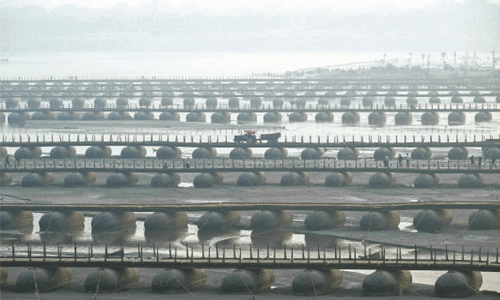ISLAMABAD: There seems to be an understanding between the ruling Pakistan Muslim League-N and the main opposition Pakistan Peoples Party that the appointment of the permanent chief election commissioner (CEC) should be delayed for as long as it takes for the parliamentary committee on electoral reforms to complete its job.
The two parties believe that any appointment on the key constitutional office, carried out in haste, could create legal and political problems in future.
Know more: Chief Justice recuses himself from bench hearing poll reform cases
Hours after a Supreme Court ruling calling on the government to fill the post by Oct 28, Opposition Leader in the National Assembly Syed Khurshid Shah said in a statement that he would explain the reasons for the delay in the appointment of the CEC before the apex court.
Mr Shah said that he and his party had the utmost respect for the judiciary and believed that each of its decisions should be implemented.
Despite SC ruling, both parties want to wait for parliamentary body’s recommendations before making a decision
The PPP leader said the mechanism to appoint the CEC was also a part of the agenda of the special parliamentary committee, headed by Senator Ishaq Dar, which was currently busy deliberating electoral reforms.
He said the new CEC should only be appointed after the finalisation of the committee’s report as there was a possibility that it might suggest a change in the current appointment mechanism, adding that he would say the same thing in the apex court.
Federal Information Minister Pervaiz Rashid backed Mr Shah’s viewpoint, saying, “it has merit”.
The minister, who also holds the portfolio of law and justice, said that under the Constitution, the CEC was appointed by the prime minister, in consultation with the opposition leader. Therefore, he said, the government would consult Mr Shah in a day or two to discuss the matter after the SC ruling.
He said that in the meeting, both sides would brainstorm on how the SC’s verdict could be implemented.
Mr Rashid said although it was not mandatory under the Constitution, the government had been known, on occasion, to consult all parliamentary parties over the appointment of the CEC. He said there was a possibility that the parliamentary committee might make this mandatory in future.
Another senior member of the PML-N told Dawn that if the government appointed a new CEC without waiting for the proposals of the parliamentary committee, he would remain in the office until the next elections, due to be held in 2018. He said that the nation was already at a political impasse due to the PAT and PTI sit-ins on the issue of alleged rigging in the 2013 elections.
Both the heads of the PTI and PAT in their speeches, he said, had criticised several times the constitutional mechanism for the appointment of the CEC. Therefore, he said, the government wanted to resolve the issue once for all.
Earlier this year, the prime minister and the opposition leader had agreed to appoint a retired judge of the Supreme Court, Rana Bhagwandas, as the CEC and the government had even prepared a bill to be passed by parliament in order to remove a legal hitch in his appointment.
Since Justice Bhagwandas has served as the chairman of the Federal Public Service Commission after his retirement from the judiciary, he is ineligible for any future appointment in the service of Pakistan under the law.
Later, when a number of parties opposed such individual-specific legislation, the government dropped the idea.
The office of the CEC fell vacant when retired Justice Fakhruddin G. Ebrahim voluntarily tendered his resignation last July amidst allegations of rigging and irregularities in the general elections.
Justice Ebrahim was the first person to be appointed as the CEC after the passage of the 18th Constitutional Amendment, which curtailed the tenure of the CEC from five years to three.
Published in Dawn, October 15th, 2014














































